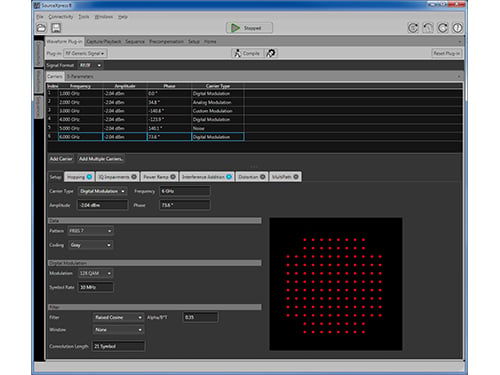Contact us
Call us at
Available 6:00 AM – 5:00 PM (PST) Business Days
Download
Download Manuals, Datasheets, Software and more:
Feedback
RF Generic Plug-in for AWG70000 Series and SourceXpress
RF signals are becoming more and more complex, making it more difficult to accurately create the signals required for the testing and characterization of RF systems. To address these challenges, RF Generic delivers advanced capabilities to synthesize digitally modulated baseband, IF and RF/microwave signals supporting a wide range of modulation schemes.
The RF Generic plug-in’s easy to use graphical user interface integrates seamlessly with the AWG5200 or the AWG70000 Series user interface and the SourceXpress platform.
| Feature | Benefit |
|---|---|
| Baseband analog or digital IQ, IF and RF/microwave signal generation on AWG Series | Synthesize waveforms directly. Apply impairments such as quadrature error and imbalance or non-linear impairments, or add interferences and multipaths during waveform creation. Replay signals at desired frequency or output. |
| Versatile carrier signal generation |
|
| Support for a wide range of modulation schemes | Define baseband I and Q signals using a variety of predefined modulation schemes such as, BPSK, QPSK, PI/4 QPSK, OQPSK, SDPSK, 8-PSK, O-8PSK, up to QAM1024, GMSK, up to 32-FSK, and analog modulations. |
| Designed with integration in mind | RF Generic has support for a Programmatic Interface built-in, allowing for immediate integration into existing workflows. |
| Offline Mode | All of the Tektronix waveform creation Plug-ins are designed to also run on an external PC via the SourceXpress platform, thereby reducing the time taken to synthesize large waveforms and leaving the AWG free for continued testing. |


